Why Searching Your Name And Googling Yourself Is Crucial
Googling yourself or searching your name online is extremely important, and here’s why:
If someone is searching your name online, the first page of results should be filled with relevant results about you. If it isn’t, that’s a problem you need to fix.
Take a second and google yourself. How do you look? Do your Google results reflect the reputation you've worked so hard to build offline?
Take our co-founder Pete Kistler for example. A drug dealer by the same name showed up in Google and he realized, “If I see this when I google my name, employers and other people who matter probably do too!”
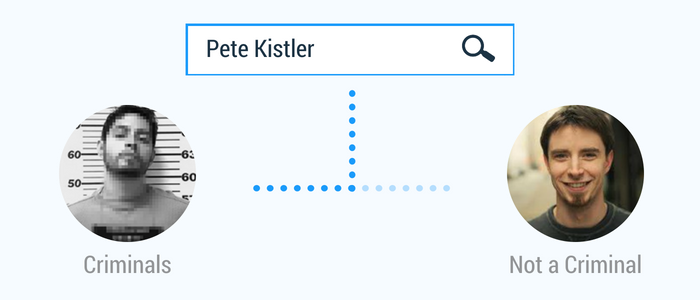
Since then we’ve built an entire business around controlling and monitoring your online presence.
That’s how important this is.
Whether you’re a student applying to school, a job-seeker, a C-Level executive or a retiree - you need to search yourself to see what people find when they google your name online.
Like It Or Not, You're Being Googled All The Time
Whether you like it or not, people are searching your name online to learn more about you. Typical online screenings can range from informal Google name searches, to contracted third-party background checks.
- 1 billion names are googled every day.
- Only 50% of people own their first result - which is the most important.
- About 1 in 4 people has no positive content at all on the first page for their Google name search.
Even more alarming, 15% of people have at least one negative result on the first page that’s damaging their reputation.
That means that if you aren’t googling yourself and controlling how you look on online, then you’re losing opportunities. The days of first impressions beginning with a handshake are over.
More than three quarters of companies perform Google name searches for job applicants online prior to meeting them in person.
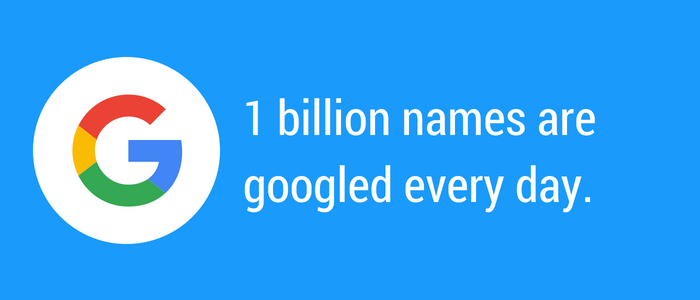
How you manage your online presence is critical to your personal brand and future success. This is true if you’re a student, an entry-level job-seeker, a CEO, a C-level exec or a teacher.
Whether you like it or not, people are googling you and searching your name online. And it’s up to you to shape what they find.
Googling yourself is important because:
Consider the frequency of online searches for your name throughout your career. Whether people are searching your name informally because they’ve just met you, or conducting a formal online screening with a third-party company - your online presence is powerful.
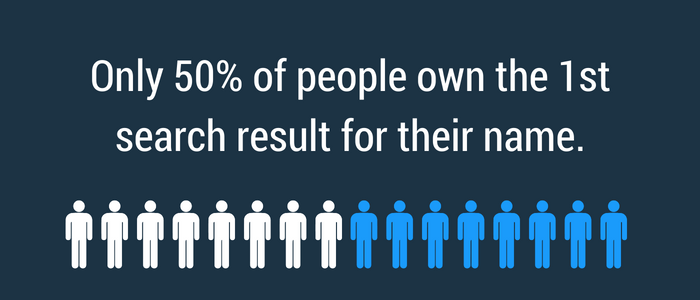
It can determine whether or not you get accepted or rejected, whether or not people want to do business with you, and can keep you from a number of personal and professional opportunities. Below we’ve gathered a few stats to put this in perspective:
- 70% of college admissions officers consider students’ online presence “fair game” when evaluating applicants.
- An estimated 90% of executive recruiters search for candidates online before extending an offer.
- While 70% of employers use social media to screen candidates.
And outside of your academic and professional pursuits, how you look online impacts your personal and dating life too.
- Among those who use online dating sites, over 34% go online to check up on their dates.
- More than 16% of all internet users have looked online for more information about someone they were dating or in a relationship with.
The reasons you need to be searching your name are plentiful. Whether you’re looking for gains in your professional, academic or personal life - what people find when Googling your name has the ability to determine the likelihood of a successful outcome.
This shouldn’t scare you, instead it should motivate you to spend some time forging an online identity that puts your best foot forward!
So how do you make sure everything looks spiffy when everyone from employers to colleagues is googling your name? Start by finding out what it is that they’re seeing.
How do I look in Google?
Before making any assumptions about what you need to do next in terms of improving how you look online, you have to google yourself to determine where your online presence currently stands.
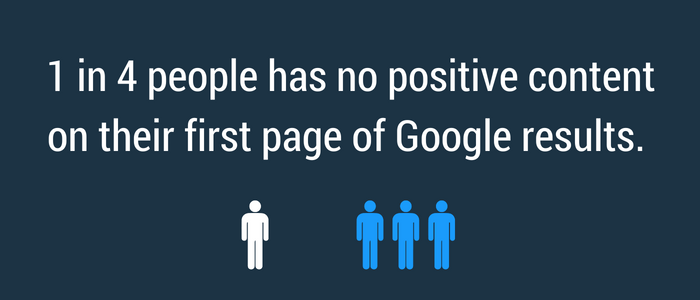
You can’t come up with a strategy until you have a truly accurate idea of how things appear when searching your name online. This is something that many people get wrong, and it costs them time and money in the long-run.
Follow these steps to get an accurate account of search rankings for your name:
Sign out of any and all of your Google accounts
You can also open a new incognito window in your web browser. Whichever measure you take (or take them both), the reasoning is the the same. Google uses personalized and local searches when you’re signed into your account.
That means that Google will slightly alter search result rankings to make them more relevant to you based on your location and any additional information associated with your Google account.
By signing out of your accounts or using an incognito window, you’re googling yourself properly. You’ll get a neutral set of results that better represent how you look in search engines.
To see what it is that others see when they google you, you must depersonalize your search as much as possible.
Enter the name people will actually use when they google your name
First of all, when it comes to making sure your online presence looks great when others are searching your name - make sure that the name on your business card, CV and professional portfolio are consistent.

This makes it easier for people and search engines to connect all of your information together. If this isn’t currently the case, or you prefer separating out your personal name from your professional name (for example, some women go by their maiden name professionally although personally and legally they’ve adopted the surname of their husband).
If there is no way to avoid multiple personal and professional names, make a list of all the potential names people would use to search for you. This should include maiden names, married names, hyphenated names, professional titles, common misspellings for your name, stage names, nicknames, etc.
After googling yourself, make a point to review the search result listings associated with all of these names. Sometimes content might show up or rank for other variations of your name that you don't normally use. It's in your best interest to get the full picture of everything that exists about you online.
If you go by multiple names professionally, now is a great time to think and decide on a clear winner. Ultimately you should decide which name makes the most sense for you.
If you need to keep multiple names professionally, you can come up with different strategies to link them or keep them as separate as possible. If you’re not sure which name you want to build professionally, reviewing the search results for each can help you finalize that decision.
Taking these two steps when googling yourself will help display the most relevant results and give you a complete understanding of what others see when searching for you online. After you’ve reviewed search results for your name, you can start to decide what category they fall into.
From there you can develop a customized solution to improve your online brand!
What’s my reputation type?
Now that you have a sense of the types of search results people find when searching your name, it’s time to identify your type. If you sign up for our reputation management software, the software will automatically scan, diagnose and monitor your online presence.
It will also send you alerts when key rankings change in Google search results for your name. All users also receive a free report, Reputation Score and a step-by-step Action Plan to improve your score.
To get a rough idea of where you stand, ask yourself which of the categories listed below best describes the majority of the search results for your name on page 1 of Google search results.
If your online presence isn’t that great, don’t worry, you’re in the company of many.
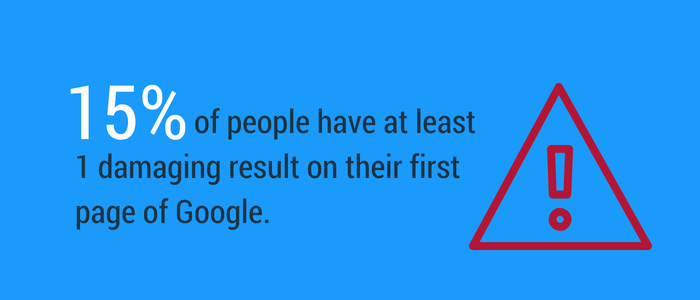
Most people let negative or irrelevant content dominate the first page of Google search results for their name. However, you don’t want to stay in this category for long.
For those of you that already have a strong, positive online presence - congrats! But you still need to actively maintain and build in order to get the most out of it. Below we’ve outlined some of the most common types of online presence you will find when googling yourself:
The Negative Online Reputation
This is the most undesirable category to find yourself in because it means you have one or more negative results representing you that people see when searching your name.
This category is not just reserved for criminals and politicians. In today's world of anonymous sharing, it's become disturbingly easy to have something online affect your life offline.
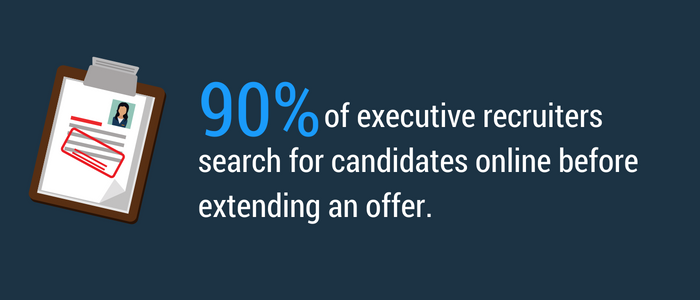
In just one status update, tagged photo or blog post from a disgruntled ex or former employee, your online presence can fall from an “A+” to a “D” in the blink of an eye. Some common types of negative results that can damage your name online include references to, or examples of:
- Recreational drug use
- Alcohol use or alcohol abuse
- Sexually explicit, nude or sexually suggestive content
- Unprofessional language and communication skills
- Unprofessional behavior
- Criminal behavior
- Bullying, violent or aggressive behavior
- Polarizing views
- Bigoted behavior
When people you want to impress are searching your name online, don’t let them see any information like that. This is the kind of content that will get you rejected from jobs, dates, partnerships and more.
Pay particular attention to any search results that you find for your name that fall into this category so that you can prioritize dealing with these results first. Oftentimes we shoot ourselves in the foot by posting incriminating photos, videos, comments etc. of ourselves that portray us in a negative light.
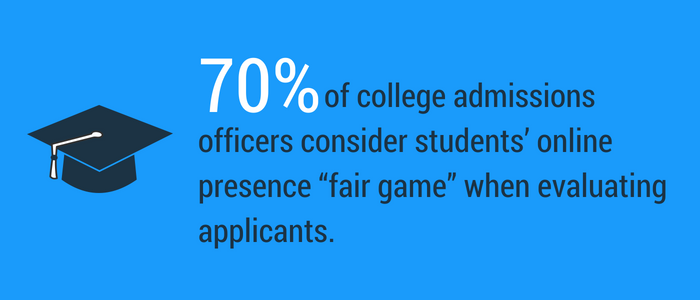
Try to think of what a boss, client, or partner would say if they saw this content coming from you. Even when you post things on social media that you think are private, there’s always the chance that you could be exposed.
Treat the internet as you would a public forum, even if your privacy settings are all on high alert. In addition to accidentally publishing content that can ultimately hurt you, there are also other common search results published by others that will negatively impact your online presence.
When someone is searching your name online, the following could damage their opinion of you:
- SEC filings
- Criminal records
- Statements that revoke your professional licensing
- Court documents
- Poor reviews from employees
- Poor reviews from customers
- Revenge sites/blogs
Unfortunately, there are a litany of ways that your name can get tarnished online. Some of these attacks can unwittingly come from you, while others are rooted in an external source. No matter the type of negative search result, the outcome is likely the same.
A negative online reputation discourages people from building or deepening a relationship with you, and prevents them from considering you for new opportunities.
How to improve what people find when googling your name and you have a negative online reputation:
- Identify the negative search results. Use our online reputation management software to scan current search results for your name and identify those that are potentially damaging to you.
- Remove everything that you can. Scan and remove all damaging social media and online content that you control. For information that you don’t control, follow BrandYourself’s emergency tactics for removal.
- Create a strategy that builds up your online presence while suppressing these negative results. Learn how to take control of your results and showcase positive content about yourself with online reputation management.
Remember to keep at it, and that these steps work in tandem when trying to improve how you look online.
The Irrelevant Online Reputation
If you google yourself, yes the results are about you. But the truth is, they don't actively help you - and can even hurt you.
An irrelevant online presence usually consists of completely outdated search results that don’t have much to do with who you are now, or your current professional goals.
For example, instead of search results that demonstrate that you’re one of the most well-respected doctors in Boston, people searching your name see that you finished 120th in a 5k run 10 years ago, and that you lived on Walnut Lane in 2010.
Sure, this doesn’t seem particularly damaging to you - and it’s definitely not going to discourage new patients in the same way a record of a disciplinary action would, but it’s still not ideal and is a huge missed opportunity.
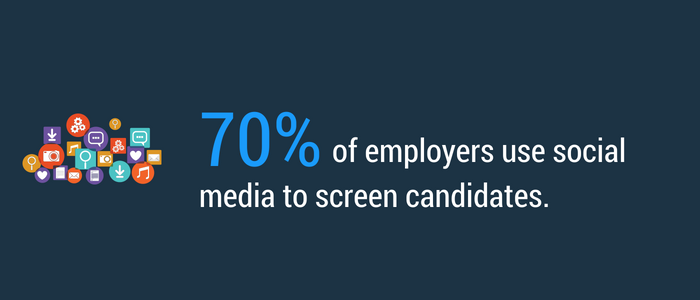
If this information ranks higher than more curated and current information about you, then you’re likely blocking new opportunities. When it comes to searching your name online, users should instantly see information about your practice, positive press pieces, and thought pieces that you authored.
That’s the kind of information that should show up first when googling your name. While the search results that rank for someone with an irrelevant online reputation are typically harmless in nature, these are actually hurting you.
If people searching for you can’t find current contact information or see your work history, then this is actually hindering your professional opportunities. An irrelevant online presence is as dangerous as a negative one!
How to improve what people find when googling your name and you have an irrelevant online reputation:
- Scan the search results for your name. Use BrandYourself’s free DIY software to scan current search results for your name and identify those that are irrelevant or neutral with where you are now professionally and where you’d like to go.
- Start the process of removal. Remove all social media and online content that you control that doesn’t fit with your personal and professional objectives. If you’re not sure what is or is not relevant, spend some more time developing your personal mission statement. Use this as a guide post for what you get rid of.
- Build a relevant brand. Create a strategy that combines search engine optimization with best practices for personal branding. Use these techniques to optimize existing properties that you control, and build new ones. This is the best way to create a high-quality, relevant brand that people find when searching your name online.
Making your online presence more relevant takes some work, but it’s not impossible. Use the tools and resources at your disposal to shape your online presence.
The "Hey that's not me" Online Reputation
In this case, your online reputation is dominated by other people (or maybe one famous person) with the same name. In a best case scenario, your name twin prevents searchers from finding meaningful information about you online (which isn’t ideal).
In the worst case scenario, the searcher will mistake your name doppleganger for you when searching your name online. This means that the person searching your name might mistake this other person’s accomplishments, legal woes, or other red flag behaviors as your own.
People in HR have a limited amount of time to screen potential candidates and pass them on to the next in-depth step of the application process. A “Hey that’s not me” situation can easily get you rejected before the process even begins. This happened to our co-founder Pete who couldn't get a job in college because he was repeatedly mistaken for an ex-convict in Google.
Not only is a “Hey, that’s not me!” situation frustrating, but it’s actively hurting you and your chances for personal and professional growth opportunities.
Luckily there are highly targeted steps that you can take in addition to traditional branding. We’ll share more tips for this scenario below in the section on taking control of your Google results.
How to improve what people find when googling your name but another person is showing up for your name:
- Searching your name with our software. As always, use our free DIY software to google yourself and scan current search results for your name and actually identify the search results that belong to someone else who shares your name.
- Think about your brand. Is the problem that this other person has built and optimized thoroughly for their (your) name? Or is it that you haven’t bothered building an online brand so they don’t really have any competition. Do you need to go by the same name as this other person? Are the search results less competitive if you go by your nickname, add a qualifier, or add your middle initial to your name? Would practicing thought leadership give you an edge? Do some research into the most viable variation of your name - meaning the version of your name that would face the least amount of competition.
- Optimize your brand around this new version of your name. Once you’ve found the best option, start optimizing existing sites and profiles that you control for your name. Start building new web properties, practicing personal SEO and building new web properties too. Don’t forget to integrate this new version of your name into your business cards, resume, and email address. Don’t let this hard work go to waste by giving contacts outdated information for your full name.
The Positive Online Reputation
This is the ideal online presence that you’re going for. A positive online presence consists of a combination of properties you control as well as other high-authority sites (that are well-respected) that present you in a positive light.
If you google yourself and the results that come up are relevant, positive and high-quality, then you can count yourself lucky. However, the most important thing to remember is that this requires active management.
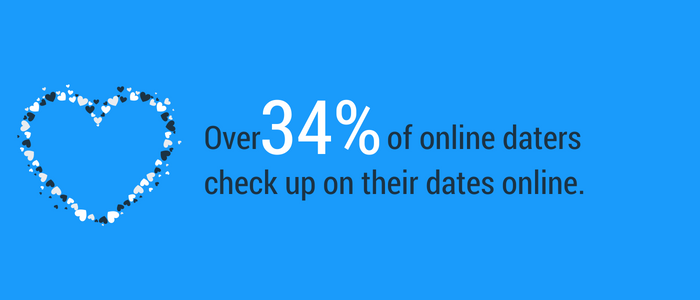
Even if you haven’t had to do much in the way of management up until this point, there will come a day when someone who shares your name decides to practice this themselves or someone writes something unpleasant about you or your name twin.
If you currently have a positive online presence, it’s up to you to keep things that way by optimizing sites and profiles that you control by following best practices for SEO. You also need to regularly publish original, high-quality content to keep your audience engaged.
This serves the double duty of keeping your properties fresh while protecting yourself from a future threat to how you look online.
How to improve what people find when googling your name and you have a positive online reputation:
- Google yourself. Use our free software to scan current search results for your name. Take note of all positive, negative and irrelevant search results. Even if most results are positive and relevant, you should also take note of search results that you can control, and those published by other parties.
- Optimize your brand. Even though you’re currently in a great spot with your online presence, that doesn’t guarantee that your properties are actually optimized. Maybe you have a very unique name, and there’s never been anything negative or unwanted published about you. If this is the case, it’s easy to become passive. Don’t! The only way to protect yourself from threats in the future is to prepare today. The only way to do this is to follow best practices for ORM. Start by pruning your social media profiles so that they are relevant, current and high-quality. Follow technical SEO practices in terms of how your sites, profiles and websites are structured. And once you’ve completed that, make sure that your properties are in alignment with your personal mission statement and professional goals.
- Stay active. Once you’ve actively optimized your existing brand, it’s up to you to protect yourself - and even create new opportunities for yourself by consistently creating and sharing high-value original content. You also need to actively cultivate an audience interested in and engaged with your work.
How to take control of your Google results
The Google results that people find when searching your name have the power to determine real-life outcomes, that’s why you need to actively manage your presence - regardless of your online reputation “type”.
Remember, the best way to take control of your Google results is to:
- Scan and audit search results.
- Remove all negative or irrelevant content.
- Build an informative, professional and engaging online presence for yourself.
- Cultivate and interact with your online audience and communities.
How we can help
Since BrandYourself was just the germ of an idea, the mission has been clear - to demystify the ORM process and empower people with the information they need to take control of their online presence.
When you google yourself, what do you find? If the answer is: “something negative”, “nothing relevant”, “information about someone with my name”, or even “something positive” - you need to create and manage how you look online.
You’re getting screened online both formally and informally all the time - and what people find matters. That’s why we’ve created a number of different ways to help people who were not happy with what they found when searching their name online.
BrandYourself offers:
Free DIY software: Our free web-based DIY software scans your current online presence for Risk Factors, then calculates your Reputation Score and generates a unique report just for you.
Premium DIY software: Our Premium software creates a customized Action Plan which walks you through all the steps you need to take in order to fully optimize your personal brand. A premium subscription also fully unlocks a number of features unavailable to free users including:
- Full access to Social Scanner and Image Scanner
- Ability to create and optimize an unlimited number of properties
- Manual refresh to scan your Google results and profiles at will
- Access to all guides from BrandYourself University
- A record of everyone who googles you and finds your BrandYourself profile
- Ability to apply a custom domain to your BrandYourself profile
- Removal of all mentions of BrandYourself from your profile: Free users have a BrandYourself banner and other mentions of BrandYourself on their profile.
- Priority customer support
Managed Services: Our experienced in-house team creates a customized strategy plan to improve your online presence and ultimately increase your professional and personal opportunities. We offer a number of online reputation management services based on your needs.
Whether you choose to use our reputation management software, or a highly-customized Managed Services package, BrandYourself is here to help.
To learn more or discuss your options, call us today at (646) 863-8226, or schedule a call with a Reputation Advisor. We look forward to hearing from you.